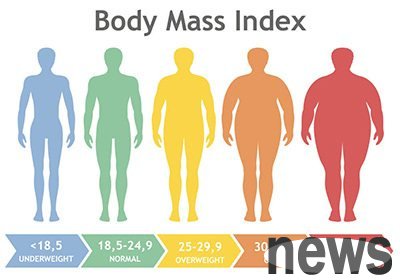I published on 2020-10-27 that my mother-in-law, a 105-year-old, and two extremes of childbirth. The purpose is to hope that everyone can think about what a healthy life habit is. Shang Gong (2021-2-3) reader Shuan left a message in the response col...

I published on 2020-10-27 that my mother-in-law, a 105-year-old, and two extremes of childbirth. The purpose is to hope that everyone can think about what a healthy life habit is. Shang Gong (2021-2-3) reader Shuan left a message in the response column of this article:
"Please teach Professor Lin. Recently, I saw a Japanese nutrition expert saying that "slightly fatter and stronger" is not very reliable. Please ask your comments? Thank you. "The link aboveopens an article published on Yuanqi.com on 2015-12-23. The title is: Overwrite imagination! Japanese experts: Slightly fatter and more sturdy, and coarse tea and light food accelerate aging. Its first and second paragraphs are: "… Japan Public Health and Elderly Medicine Authority New Public Health II proposes that slightly fat people will be longer than thin people," … New Public Health II points out that a survey in Japan found that the BMI value is the lowest (
mentioned in this article is a reduction of Body Mass Index, and its calculation formula is: Dividing body weight (kg) by height (meter), and then divided by height (meter). For example, a person with a weight of 70 kg and a height of 170 cm, his BMI = 70 ÷ 1.7 ÷ 1.7 = 24.2.
BMI is used to evaluate whether a person is overweight, and is also extended to evaluate whether he is obese. The World Health Organization held a meeting in Geneva, Switzerland in 1997, positioning "Normal Weight" as BMI between 18.5 and 24.9, "Overweight" as BMI between 25 and 29.9, and "Obacteria" as BMI between 30 and above.

In fact, using BMI as a health index is flawed. For example, a bodybuilder has muscles in his body, but according to BMI, he is positioned as obese. In addition, of course, fat is also a good one: subcutaneous fat is good, but abdominal fat is bad. Unfortunately, Asians usually have a higher proportion of abdominal fat compared to white people. Therefore, although it is also positioned as obese (BMI of 30 or above), Asians have higher health risks than white people.
The Japanese expert "New Opening Second", mentioned in the Yuanqi Network article, his English name is Shoji Shinkai. Using this name and BMI, I searched in PubMed, a public medical library, and found a total of 10 articles. Only two of these 10 articles are about BMI and mortality, and they were all published in 2020. However, it is strange that the article on Yuanqi.com was published in 2015.
Nevertheless, the title and conclusions of the two articles are:
Age and gender differences in the association between body mass index and all-cause mortality among older Japanese. Conclusion: In older Japanese, low BMI (Dose-Response Relationships Between Body Composition Indices and All-Cause Mortality in Older Japanese Adults Conclusion: Fatless mass index (FFMI) and skeletal muscle mass index (SMI) are more pronounced mortality prediction indicators compared with body mass index (BMI) and fat mass index (FMI). In other words, since BMI calculates both fat and muscle into body weight, it is unreliable to use it to evaluate the correlation between body weight and mortality.
The title of the Chinese online article "Under imagination! Japanese Expert: A Little Fat and Longer Prison" is also ridiculous. You know, as early as the 1980s, someone proposed the theory of "A Little Fat and Longer Prison", and the most famous one is Dr. Reubin Andres, the authoritative doctor of the elderly. Please see Reubin Andres published on September 30, 2012. an Advocate of Weight Gain, Dies at 89 (Wheight Gain Advocate Lubin · Andres died at the age of 89).
Public health experts at Harvard University also published Body weight and longevity in 1987. A reassessment to reflect the discussion of Dr. Reubin Andres.
Four experts from the CDC in the United States (including Dr. Flegal) also published the Association of all-cause mortality with overweight and obesity using standard body mass index categories: a systematic review and meta-analysis.
This paper analyzed a total of 97 clinical research reports on the correlation between BMI and mortality, and one of the conclusions was that excessive (i.e., BMI between 25 and 29.9) was related to reducing all-cause mortality. However, public health experts at Harvard University responded immediately, publishing Overweight, obesity, and all-cause mortality. They said: "In contrast to the conclusions of Flegal et al., the literature provides clear evidence that even appropriate obesity has many adverse health and social consequences, including reduced quality of life, increased medical care costs and increased mortality."
Most importantly, in 2016, The Global BMI Mortality Collaboration, composed of nearly 100 experts around the world, published the Body-mass index and all-cause mortality: individual-participant-data meta-analysis of 239 prospective studies in four Continents (physical quality index and all-cause mortality: a single participant data analysis of 239 prospective studies on four continents).
This large study included more than 1,000 people in 239 prospective teams in 32 countries, and concluded that all-cause mortality rates were the lowest for BMI between 20 and 25. In other words, the mortality rate begins to rise once the BMI exceeds 25, which is of course contrary to the "BMI greater than 27" mentioned in "New Province II" and "There is no correlation between the higher mortality rate".
However, despite this, Taiwan's media continued to promote "Slightly Fatty and Longer Than" after 2016. For example, the published "Healthy Cloud" on 2017-1-30 will not always lose weight! "Slightly fat" is the healthiest! There are some good things. The "slightly fat" published by "Daily Health" on 2017-6-26 is the indicator of long-term poverty, the "slightly fat" published by "Good Medical Health" on 2018-5-16, and the "slightly fat" published by "Health 2.0" on 2020-7-16, are even longer! .
The media, called "Health" or "Good Medicine", are truly the true sheep selling dog meat.
Note 1: "Slightly Fatty" is "Overweight", which means that the BMI is between 25 and 29.9, and its relationship with health and life is still being debated. Therefore, health information disseminators should let the public know that there are arguments from both positive and negative schools, and not use the terms "Overwrite the Imagination" and "So slightly fat is the indicator of long-term poverty" to mislead the public.
Note 2: We personally believe that "Micro Fatty" may be harmless, especially because it may be different from others, but it should never be the goal of pursuit. The most important thing is to have a balanced diet and exercise. It is best not to be fat, but if you are slightly fat, it will be natural and don’t worry too much.
Original text: Slightly fatter and stronger? Overwrite imagination?